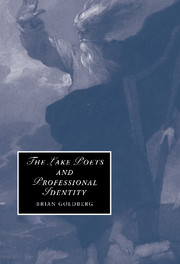Book contents
- Frontmatter
- Contents
- Acknowledgments
- Introduction: Professionalism and the Lake School of Poetry
- Part I Romanticism, risk, and professionalism
- 1 Cursing Doctor Young, and after
- Part II Genealogies of the romantic wanderer
- Part III Romantic itinerants
- Part IV The Lake school, professionalism, and the public
- Notes
- Bibliography
- Index
1 - Cursing Doctor Young, and after
Published online by Cambridge University Press: 14 January 2010
- Frontmatter
- Contents
- Acknowledgments
- Introduction: Professionalism and the Lake School of Poetry
- Part I Romanticism, risk, and professionalism
- 1 Cursing Doctor Young, and after
- Part II Genealogies of the romantic wanderer
- Part III Romantic itinerants
- Part IV The Lake school, professionalism, and the public
- Notes
- Bibliography
- Index
Summary
ROMANTIC PROFESSIONALISM
Wordsworth, Southey, and Coleridge belonged to a fraction of the English population that provided many of the nation's “professional gentlemen,” and they hoped that their personal status, which existed at the beginning of their careers in the form of a culturally determined potential, might be lent to the pursuit of letters. Further, they hoped that the transference would generate an improving reciprocity between the individual poet and an emerging vocational identity. This formulation, which posits an already held kind of standing that is subsequently loaned out before it is earned, may appear circular, but it is an accurate depiction of the work of the sociological imagination as these poets exercised it. However, as we have seen, the professions as they actually existed were multiplicitous and, at least from the point of view of the Lake poets, they could be unacceptably associated with the shortcomings of the old regime. This chapter examines some of the relevant definitions of professional identity that the Lake poets would try to manage, and it traces some of the ways the poets would make the idea of “risk” into a principle that distinguished a traditional professional identity from a more progressive and acceptable one. As they did so, debates about the afterlife provided the poets with one metaphorical basis for measuring properly risky against moribund forms of professional practice.
- Type
- Chapter
- Information
- The Lake Poets and Professional Identity , pp. 27 - 60Publisher: Cambridge University PressPrint publication year: 2007



